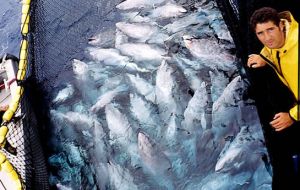MercoPress. South Atlantic News Agency
Strong calls for banning Atlantic bluefin tuna trade
 Most Atlantic bluefin tuna are caught in the Mediterranean Sea, but most of the meat is consumed in Asia
Most Atlantic bluefin tuna are caught in the Mediterranean Sea, but most of the meat is consumed in Asia Banning trade in Atlantic bluefin tuna is justified by the extent of their decline, an analysis by scientists advising fisheries regulators suggests. The International Commission for the Conservation of Atlantic Tunas' (ICCAT) advisers said stocks are probably less than 15% of their original size.
The analysis has delighted conservation groups, which have warned that over-fishing risks the species' survival. ICCAT meets to consider the report in 10 days' time.
The analysis was triggered by Monaco's recent proposal to ban international trade in the Atlantic bluefin under the Convention on International Trade in Endangered Species (CITES) - a proposal that has gathered support from several other European countries.
“What's needed to save the stocks is a suspension of fishing activity and a suspension of international commercial trade,” said Sergi Tudela, head of fisheries with the environmental group WWF for the Mediterranean region.
“We must stop mercilessly exploiting this fragile natural resource until stocks show clear signs of rebound and until sustainable management and control measures are firmly put in place.”
The body charged with regulating catches of the southern bluefin, a closely related species, has just approved 20% quota cuts across the board.
For a number of years, ICCAT has set quotas higher than scientists' recommendations.
The pressure this puts on stocks has been compounded by illegal fishing for this valuable species, which according to some estimates adds 30% to the official quota.
Last year, an independent report concluded that ICCAT's management of tuna was a “disgrace”, blaming member countries for not accepting scientific advice and for turning a blind eye to their fleets' illegal activities.
The report recommended interim closure of the Mediterranean fishery, where most bluefin are caught - a measure that won backing from the US. Frustrated by what it saw as ICCAT's inability to control the problem, Monaco's government - supported by conservation groups - submitted its CITES proposal.
The proposal will be heard at the CITES meeting in March. If enacted and enforced, it would severely hamper the trade.
Atlantic bluefin tuna are mainly caught from countries around the Mediterranean Sea, but most of the meat is consumed in Asia, particularly Japan.
Japan has previously argued that commercial fish species should be controlled by bodies like ICCAT rather than CITES.
“The right thing would be to impose a zero quota,” said Sue Lieberman, director of international policy for the Pew Environment Group.
“It wouldn't be forever - stocks will recover, but not at current rates of catch.”
ICCAT's scientific committee considered different ways of analysing the decline - whether to start from estimates of how many bluefin there were before industrial fishing began, or from the largest stocks reliably recorded, and according to different rates of reproduction.
They concluded that whichever way the data is cut, it is 96% likely that numbers in the east Atlantic and Mediterranean are now less than 15% of their pre-industrial-fishing size. CITES guidance suggests this would trigger a trade ban for a slow-reproducing fish species.
For the western Atlantic stock, subject to much smaller catches, the figure is 93%.
At its forthcoming meeting in Brazil, ICCAT delegates will decide whether to place new restrictions on catches.
“ICCAT's track record isn't too good,” commented Dr Lieberman, “but they could surprise us”. Usually, ICCAT makes reports such as this one publicaly available.
But because of its “controversial and politically-charged nature”, the commission asked members to “consider refraining from distributing this report” before the Brazil meeting, and it is not clear if and when it will be posted on the organisation's website. (BBC).-




Top Comments
Disclaimer & comment rulesCommenting for this story is now closed.
If you have a Facebook account, become a fan and comment on our Facebook Page!